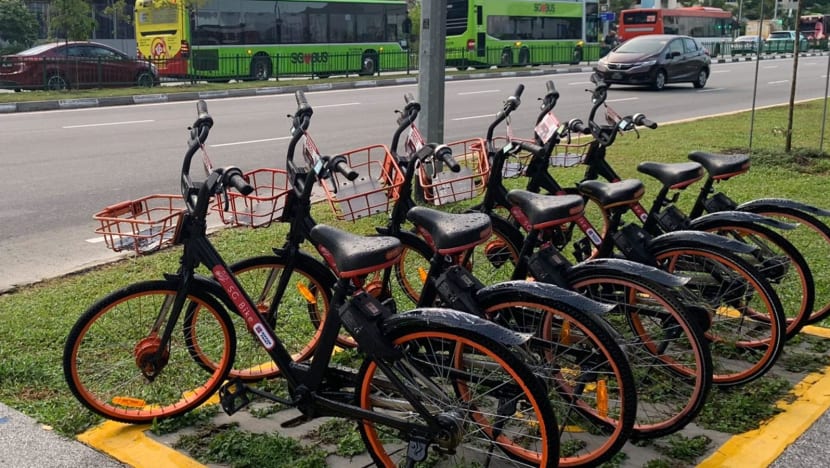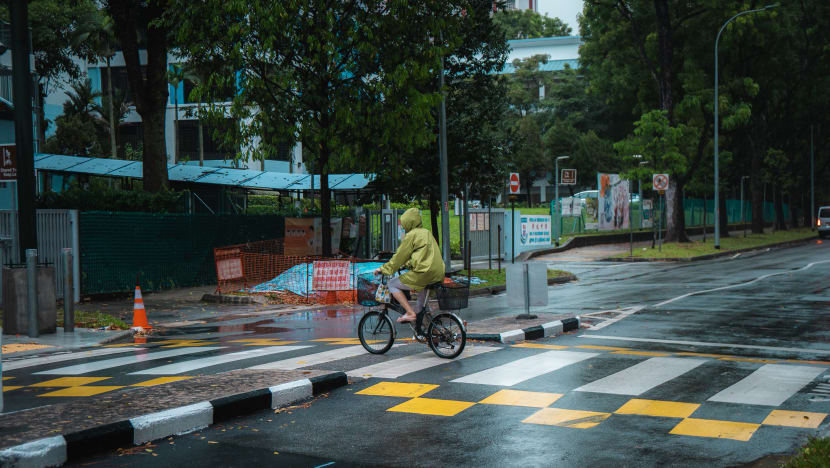Commentary: SG Bike exit offers a lesson on forming habits beyond bike-sharing
Cycling simply never became a habit nor the choice of travel for most, but that can change, say Samuel Chng and Sarah Chan from SUTD’s Lee Kuan Yew Centre for Innovative Cities.

A row of parked SG Bike bicycles. (File photo: Facebook/SG Bike)

This audio is generated by an AI tool.
SINGAPORE: Was it really surprising to many when local bike-sharing operator SG Bike announced on Mar 21 that it would exit the Singapore market?
Even without the sweltering heat of recent weeks discouraging us, bike-sharing had not really bounced back to the levels of its peak after the dramatic bust of first-wave operators, oBike, ofo and Mobike.
Singapore’s bike-sharing market is now left with just two operators, local player Anywheel and Chinese firm HelloRide. No doubt, SG Bike’s exit will offer lessons for them and policymakers looking at active mobility.
Is this the beginning of the end for the second wave, or even the final nail in the coffin for bike-sharing here?
The outlook doesn’t have to be grim. Much has changed since the first wave of bike-sharing, from significant expansions of our cycling infrastructure to the Active Mobility Act that set out rules and code of conduct for the sharing of public paths.
These work together to promote cycling on our island. The second wave operators were riding on these developments and existing – even prospective – operators have a more conducive physical and regulatory environment to work in.
Nevertheless, the much hoped-for shake-up that bike-sharing would bring to how we move around the city never materialised simply because cycling never became a habit nor the choice of travel for most.
BUILDING BEHAVIOUR, NOT JUST INFRASTRUCTURE
For behaviours to change and new habits to form, three key components should be present: The capability, the opportunity and the motivation to carry out the behaviour, which psychologist Susan Michie and colleagues developed as the COM-B model.
A lack in any one of the three would be enough to prevent a behaviour and habit from forming. Bike-sharing did not stick because all three were lacking for many. This model also offers a way to think of cultivating behaviour more deliberately, and not just providing a service or infrastructure and thinking the behaviour will naturally follow.
First, the capability of performing the behaviour. Those who are unable to ride a bicycle face a physical barrier. Those who have trouble navigating the dockless bike-sharing applications and cashless payment methods face a technological barrier.
Psychological barriers may further inhibit the use of bike-shares, such as hygiene concerns, uncertainties over regulations on where bikes can be parked, or even negative memories from past experiences. More than 200,000 users were left with unrefunded deposits when oBike suddenly exited in mid-2018.
How can we help people to realise their capability? How can they be encouraged to take that first ride, ever or in a very long time, on a bike-share?
THE RIGHT OPPORTUNITY AND MOTIVATION
Next, the opportunities that enable the behaviour. Despite expansions in cycling infrastructure, the weather remains the most glaring challenge. Rain and shine, this is only going to get more extreme with climate change.
Then there is the issue of placement. The largest bike-sharing operator today may be Anywheel, but the bikes are not everywhere. While designated parking areas limit public disamenities, they also limit accessibility and convenience, which was a key draw in its heyday.

Yet another gap in opportunity arises from the lack of positive social influence. Today, commuting by bike is still far from being a social norm and cycling is arguably more an activity of recreation rather than travel for many.
How can we multiply the opportunities where bike-sharing can be seen as a viable option, especially when we see fewer bikes than before? How do we tackle the challenge of making bikes out of sight, but not out of mind?
The final piece of the puzzle is motivation. A promise of bike-sharing systems around the world are the benefits for environmental sustainability and public health, while offering affordable first- and last-mile travel options.
For most in Singapore, these aspirations are secondary to more immediate concerns like getting to work on time and comfortably.
No doubt there are some who heed the call for sustainability or see the personal health benefits of cycling. Chances are, though, they already own bikes.
For someone who is already walking, taking the bus or commuting on a personal bicycle, there is little to no added incentive to cover that same distance on a bike-share.
What could motivate existing cyclists to consider bike-sharing? And non-cyclists to consider it as part of their travel, especially for first- and last-mile trips?
BEYOND BIKE-SHARING
It’s premature to mark the demise of bike-sharing without trying to shift behaviour more purposefully. This is also true for other challenges that require changing behaviors and forming new habits.
The longstanding challenge of recycling is one example. Beyond national campaigns, blue bins and the Bloobox, what else is needed for individuals and households to be able to and want to engage in high-quality recycling?
The challenge of moving towards more sustainable lifestyles where we consume less and in a manner that is more responsible for our environment is another. Building on the movement to use your own bags in supermarkets, can this now be the new habit even when we dabao food from the hawker centres?
From our point of view as psychologists, it is clear that simply having the desire to do something is not enough. To change behaviour and create a new habit, we need to ensure that we possess the capability, opportunity and motivation to do so. Taking such human-centred approaches can only bode well for the development of successful services, campaigns and policies.
Samuel Chng is Senior Research Fellow and heads the Urban Psychology Lab at the Lee Kuan Yew Centre for Innovative Cities at the Singapore University of Technology and Design (SUTD). Sarah Chan is Chan Heng Chee Research Fellow at the same Centre. The opinions expressed are those of the writers and do not represent the views and opinions of SUTD.





















